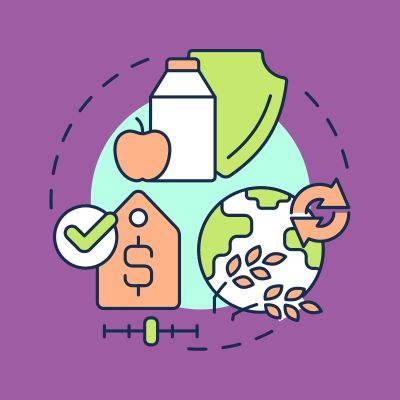
Where is the Food Industry going and what challenges might we be already facing?
Having seen many different things on LinkedIn and listening to a lot of health and wellbeing podcasts, it got me thinking about what current trends in the market may have an effect on the food industry, along with the general challenges across the globe that many people don’t think about, but the sector are constantly talking about.
1.Sustainability and Eco-Friendly Practices
Carbon Footprint Reduction:
Now this isn’t new, but I have seen more about British Grown, more than ever. But is this truly feasible!? The industry is examining ways to reduce its carbon footprint, from sourcing raw materials to energy-efficient manufacturing processes. Some companies are investing in renewable energy and carbon offset initiatives. More and more companies are realising the benefit of Aerobic Digestion – lots of companies are looking to utilise investment in this area…..and making money off the back of it!? Is this the new form of diversification?
2.Personalised Nutrition/Health & Wellbeing Trends
Customised Food Products:
Advances in data analytics and biotechnology are enabling food manufacturers to create products tailored to individual dietary needs, preferences, and health conditions. In the world of Gut health, microbiomes and everything in between….are we going into a world where this is going to be the norm?
Nutrigenomics:
This emerging field studies the relationship between an individual's genetics and their response to certain foods, allowing for more personalized nutrition plans and product development. We all seem to know someone who has a large number of intolerances that will ultimately affect their buying trends.
Functional Foods:
There is an increasing demand for foods that offer health benefits beyond basic nutrition, such as probiotics, prebiotics, and foods fortified with vitamins and minerals. The world of supplementation, anti-inflammatory properties of turmeric and the ever growing market of Nootropics.
3.Regulatory Changes and Compliance
Nutrition Labelling and Health Claims:
Ongoing debates around clear labelling, especially regarding sugar content, allergens, and GMOs, are leading to changes in regulations that manufacturers must adapt to. Even in food service and hospitality, I have never seen so many “kcal” labels on the menu’s as well. For some this can be great, but for others it can be dangerous and counterintuitive.
Regulation of Novel Foods:
As new food products like lab-grown meat and insect-based foods enter the market, regulatory bodies are developing frameworks to ensure their safety and proper labelling.
4.Global Supply Chain Challenges
Supply Chain Resilience:
The COVID-19 pandemic and geopolitical events have highlighted the vulnerabilities in global food supply chains. Discussions focus on diversifying supply sources, improving logistics, and investing in local production to mitigate risks.
Raw Material Shortages:
Fluctuations in the availability and cost of raw materials due to climate change, geopolitical tensions, and other factors are impacting production and pricing strategies.
5. Ethical Sourcing and Fair Trade
Supply Chain Ethics:
Consumers are more concerned about the ethical sourcing of ingredients, leading to discussions on fair trade, humane treatment of animals, and the use of child labour in supply chains.
Transparency and Certifications:
Certifications like Fair Trade, Rainforest Alliance, and others are becoming more important as consumers demand proof of ethical practices.
